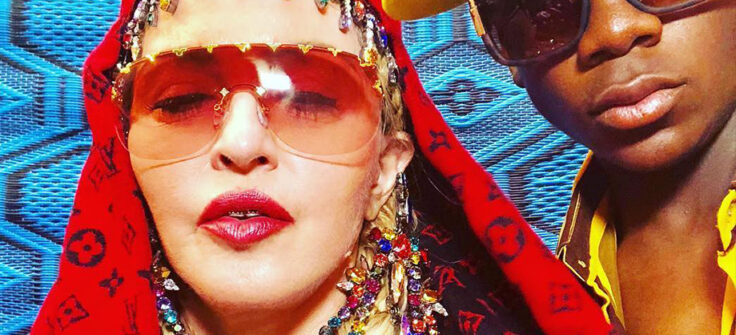Madonna is no stranger to scandal and controversy—in fact it’s this exact provocative nature that’s turned her in to the pop icon that she is today.
But her recent interest in Moroccan culture and Amazigh accessories has left a few questioning whether the singer has finally crossed the line.
For her 60th birthday celebrations, the ‘Like A Virgin’ singer decided to mark the day in Marrakesh. What followed a reported trip to the Red City’s souks was a photo posted to her instagram, captioned “Almost Birthday Selfie – Celebrating Berber Culture!”.
Almost Birthday Selfie- ???????. Celebrating Berber. Culture! ??♥ #birthday #nomad #magic #Marakesh
Une publication partagée par Madonna (@madonna) le
In the photo, she wore an Amazigh headpiece—one that’s largely attributed to southeastern parts of Morocco—more specifically to a small nomadic warrior tribe called Aït Baâmrane, whose women once wore the horned headdresses as weapons.
Madonna then wore the headpiece once again at the VMAs, which caused people from both sides of the cultural appropriation argument to come to the forefront. Some accused the pop icon of appropriation, while others viewed it as a tribute to a culture she had just been introduced to.
But this isn’t the first time Madonna has been accused of cultural appropriation. The singer’s music video for her 90s hit ‘Vogue’ was centered around a dance that originated within gay Black and Latino communities in the United States (something that’s recently been compared to Miley Cyrus’s take to twerking in 2013).
And then there was her ‘hindu’ themed ‘Ray of Light’ performance at the 1998 VMAs. Not to mention the fact that she’s has long-been chastised for the constant religious references and symbolism in her music videos.
To her critics and cultural appropriation accusers, Madonna boldly stated, “they can kiss [my] ass”, in an interview with the Huffington Post. To her, her artistry allows her to seek ‘inspiration’ from within other cultures. “I’m not appropriating anything”, she said. “I’m inspired and I’m referencing other cultures. That is my right as an artist. They said Elvis Presley stole African-American culture. That’s our job as artists, to turn the world upside down and make everyone feel bewildered and have to rethink everything”.
To her, and to countless others who have left positive comments under her photos, the star is leaning more towards appreciation than appropriation. On Instagram, comments pour under her photos proudly testifying: “You made all amazigh/berber people around the world so happy by your posts…”), her actions lean more towards appreciation. Meanwhile Moroccan contemporary artist Hassan Hajjaj invited the singer in to his riad and went as far as to shoot her in the attire.
The New Drip ? in Marrakesh ♥???? #levelup #morocco #birthday #fun #banda
Une publication partagée par Madonna (@madonna) le
The line between cultural appropriation and appreciation is a thin one. This isn’t to say that perpetual appropriation is excusable (it’s not), but Madonna’s far-out provoking ways are probably what have allowed her to tread between it for so long.









